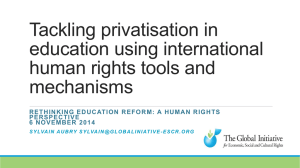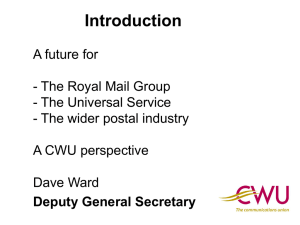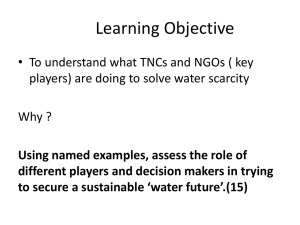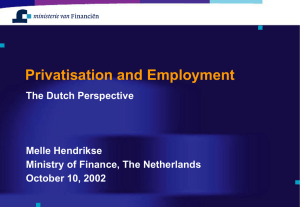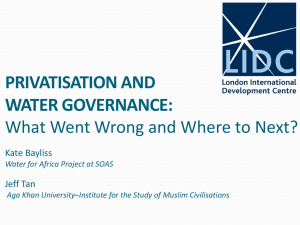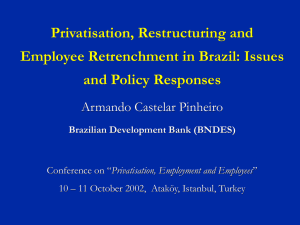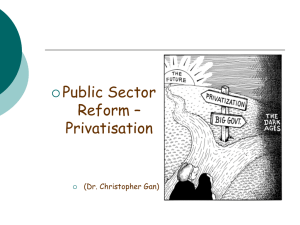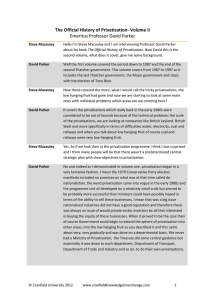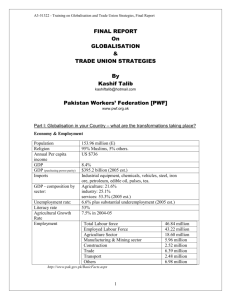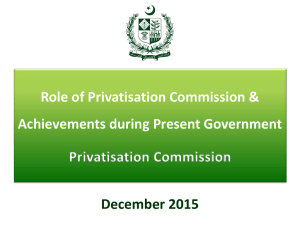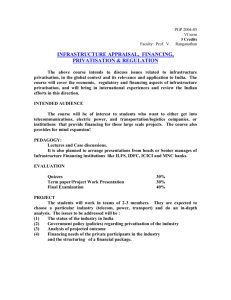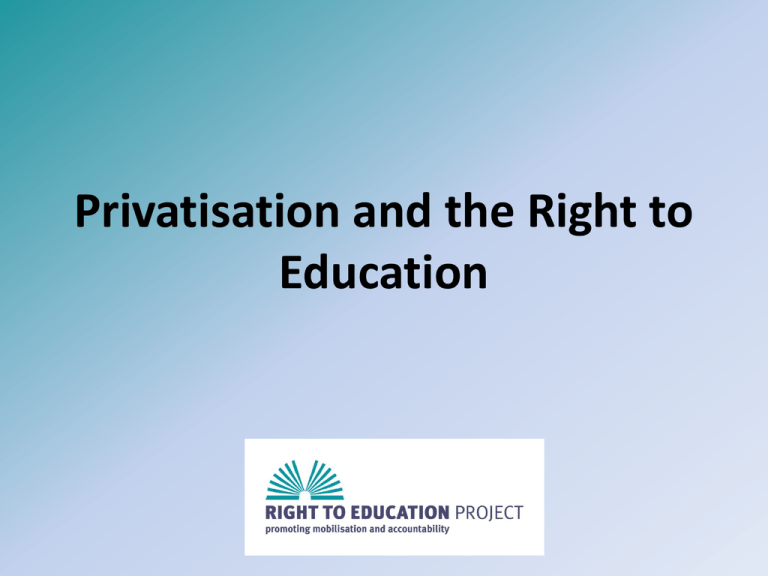
Privatisation and the Right to
Education
Objectives
1. Develop an understanding of the right to education
2. Become familiar with key State obligations concerning the
right to education that may be affected by privatisation
3. Gain and understanding of education privatisation,
including the forms and processes that may impact the
right to education
4. Practically apply the right to education to scenarios and
consider the implications
5. Explore strategies for applying a human rights based
approach to education privatisation
Right to Education Project
What Are Human Rights?
Rights are inherent to all human beings and are
protected through internationally agreed legal
standards that States have committed to upholding
through treaties.
Human rights are:
Universal
Indivisible
Inter-related & Inter-dependent
Right to Education Project
Equality & Non-Discrimination
Non-discrimination prohibits any distinction, exclusion
or limitation based on the listed grounds
States guarantee these rights without
discrimination of any kind on the grounds of
race, colour, sex, language, religion, political
or other opinion, national or social origin,
property, birth or other status.
Right to Education Project
The Right to Education in Law
Main International Human Rights Treaties Containing
Provisions on the Right to Education
International Covenant on Economic, Social and Cultural Rights
Convention on the Rights of the Child
Convention on the Elimination of All Forms of Racial Discrimination
Convention on the Elimination of All Forms of Discrimination against
Women
Convention on the Rights of Persons with Disabilities
UNESCO Convention against Discrimination in Education
Right to Education Project
What is the Right to Education?
• Free & compulsory primary education
• Available & accessible secondary & technical/
vocational education that is progressively free
• Equally accessible higher education based on capacity
and progressively made free
• Fundamental education for those who could not
access or complete primary education
• System of schools with continuously improved
conditions & enhanced educational access for
individuals from disadvantaged groups
Right to Education Project
What Are the Aims of Education?
• The full development of the child’s personality, talents and
mental and physical abilities
• The development of respect for human rights and fundamental
freedoms
• The development of respect for the child’s parents, cultural
identity, language and values, as well as respect for the values of
the child’s country and other civilisations
• The development of the child’s responsibilities in a free society,
including understanding, peace, tolerance, equality, and
friendship among all persons and groups
• The development of respect for the natural environment
Right to Education Project
The 4 As
Available
Accessible
Education should be free with adequate
infrastructure, trained teachers &
materials
The education system should be
accessible to all without
discrimination and positive steps must
be taken to include the most
marginalised
Acceptable
Adaptable
The content of education must be
relevant, non-discriminatory, culturally
appropriate & of good quality; schools
must be safe & teachers should be
professionally trained
Education must evolve with the
changing needs of society & it must be
adapted to the local context
Right to Education Project
Educational Freedoms
The liberty to establish and
direct educational
institutions, subject to the
requirement that these
must conform to minimum
standards laid down by the
State
The liberty of parents to
choose schools other than
public schools for their
children, according to their
religious and moral
convictions
Right to Education Project
Definitions
Private Education
Education that is provided by non-State actors, including
companies, religious institutions, NGOs, trusts or private
individuals
Privatisation
A process of transferring education assets, management,
functions or responsibilities previously owned or carried
out by the State to private actors
Right to Education Project
Human Rights Concerns
Protecting
Rights
Transparency
Regulation
Best
Interests of
the Child
Ensuring
Access
Assessing
Impact
NonDiscrimination
Right to Education Project
How Is Education Privatised?
From PERI:
1. For Profit Schools
2. Public-Private Partnerships
3. Low Fee Schools
4. Private Tutoring
5. Philanthropy Schools
Right to Education Project
The Nature of State Obligations
Respect
Protect
Fulfil
• To not
interfere with
the exercise
of rights
• To ensure
others do not
interfere,
primarily
through
effective
regulation &
remedies
• To take
positive
action to
facilitate the
enjoyment of
rights
Right to Education Project
Progressive Realisation
Progressive
Realisation
towards
the full
realisation
of the right
to
education
Take Steps - Deliberate, concrete &
progressive to the maximum available
resources
Minimum Core Obligations – Ensure the
minimum essential levels of rights
No Backwards Steps (Retrogression)
Right to Education Project
Free Education
Primary education shall be compulsory
and available free to all
Secondary education should be available &
accessible & made progressively free
Higher education should be accessible and
made progressively free
Right to Education Project
Equality & Non-Discrimination
Non-discrimination prohibits any distinction, exclusion
or limitation based on the listed grounds
DISCRIMINATION includes any distinction,
exclusion, limitation or preference that has the
purpose or effect of nullifying or impairing
equality of treatment in education
Right to Education Project
Monitoring & Regulation
The State must establish minimum standards for
private providers
These minimum standards must comply with
human rights law
The State must maintain a transparent & effective
system to monitor these standards
Right to Education Project
Education Financing
Minimum core obligations
& progressive steps to
fully realise the right to
education
Informal alternatives &
private sector to fill
education gaps
Right to Education Project
Continuous Improvements to Quality
States must continuously improve the material conditions of
teaching:
Trained and qualified teachers paid competitive salaries &
continuing education
Access to appropriate learning materials
Relevant and culturally appropriate curricula and childcentred teaching methods
Non-discrimination in education delivery
Adequate school infrastructure and safe environment
Right to Education Project
Participation & Transparency
Privatisation programmes should be open
and transparent and should include the
participation of the affected community.
States should take care to avoid creating
imbalances of power between private actors
and communities through experimental
privatisation programmes.
Right to Education Project
Effective Remedies
The right to an effective remedy forms part of the
human rights framework, and States must ensure
that effective remedies are available in order to
address violations that may occur pertaining to
private education or privatised services.
Right to Education Project
Gathering Evidence
• Look for existing data / evidence & apply human rights
analysis
• Gather new data / evidence from the field
• Influence other actors (e.g., academia) to carry out
research on key privatisation topics or areas of
concern
• Analyse existing government policy documents
regarding privatisation against human rights standards
Right to Education Project
Gathering Evidence: Example
Example: Accountability for Quality Teaching
Human rights
standards
Salaries of public
National requirements for public
Right to work - Fair
school teachers;
teacher pay scales and minimum
wages and equal
Salaries of private
qualifications; National requirements remuneration for
school teachers;
for private teacher pay scales and
work of equal value
Highest qualification
minimum qualifications; National
level attained by public requirements for continuing
Right to education –
school teachers;
education for public school teachers; Minimum teacher
Highest qualification
National requirements for private
qualifications,
level attained by
school teachers; Individual school
adequate teacher
private school
policies on salary, qualifications, and training, domestically
teachers; Completion
continuing education; Availability of competitive teacher
of continuing
teacher training providers and
salaries
education; etc.
placements; etc.
Outcomes
Policies
Right to Education Project
Inquiry
• Send requests for information to the government
(usually a formal process)
• Set up a meeting with key ministry officials to inquire
about privatisation policies & represent civil society
concerns as a coalition
• Organise public meetings on education privatisation &
invite government officials, parents, teachers,
community leaders, etc.
• Organise a workshop to share information on
privatisation with key stakeholders
Right to Education Project
Developing a Campaign
Objectives
What is the change that you want to
make?
Targets
Who are the decision-makers on this
issue? Who else can influence the
decision-makers?
Messages
What is the message aimed at your
targets?
Tactics
What tactics will you use to bring
about changes, e.g., direct lobbying,
media, etc.?
Right to Education Project
Resources
• Right to Education Project (RTE) – www.right-toeducation.org
• Privatisation in Education Research Initiative
(PERI) – www.periglobal.org
• Global Campaign for Education (GCE) –
www.campaignforeducation.org
• Education International (EI) – www.ei-ie.org
• Save the Children – www.savethechildren.org
Right to Education Project

